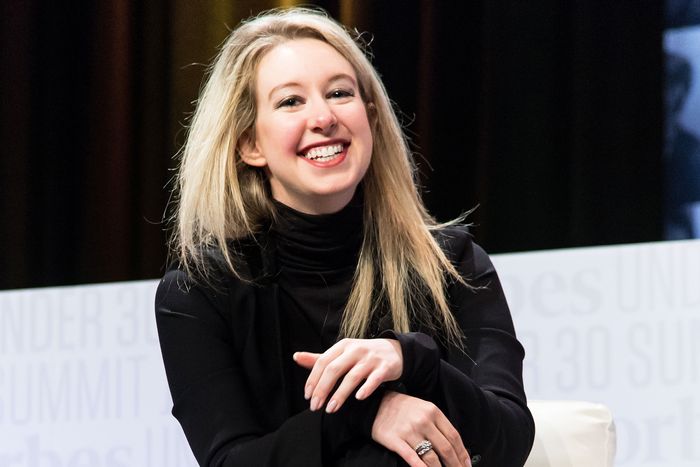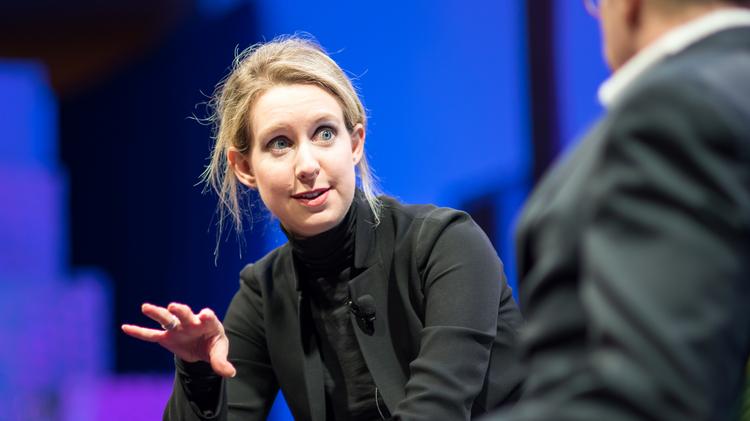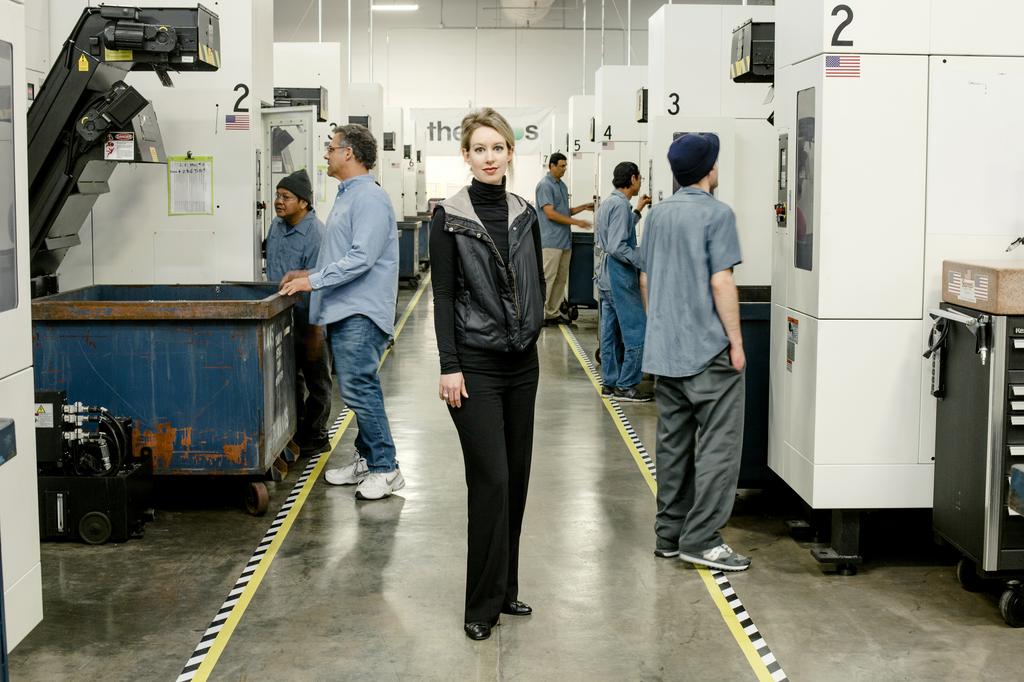03/21/2019

There are many fascinating, upsetting details in the story of Elizabeth Holmes, but my favorite is her voice. Holmes, the ousted Theranos founder who was indicted last year on federal fraud charges for hawking an essentially imaginary product to multi-millionaire investors, pharmacies, and hospitals, speaks in a deep baritone that, as it turns out, is allegedly fake. Former co-workers of Holmes told The Dropout, a new podcast about Theranos’s downfall, that Holmes occasionally “fell out of character” and exposed her real, higher voice — particularly after drinking. (Holmes’s family recently denied these claims to TMZ, insisting her voice is naturally low, just like her grandmother’s.)
In the new Theranos HBO documentary, “The Inventor,” Holmes’ baritone is on full, strange display. There is a moment in which the camera person filming Holmes for an earlier interview segment asks her what her favorite Star Wars sound is (?), and she says Yoda. The cameraman then asks her to do Yoda’s voice, and for a moment, I held my breath. She pauses, and then, in the same deep mumble, recites: “Do or do not, there is no try.”
If you hunt around online, you can sometimes find YouTube videos in which Holmes can be heard using that real voice before catching herself and deepening it, but these videos have a tendency to be taken down after a day or two. This, of course, only makes me more interested. Holmes is obviously guilty of many more serious crimes, but faking one’s voice is just weird, and embarrassing, in much the same way that bad toupees are: they place one’s bodily insecurities center stage. Plus, now she’ll have to do this voice for the rest of her life (?), and it’s all I can think about. The internet’s reaction to the podcast, and to Bad Blood, John Carreyrou’s book about Theranos, suggests I’m not alone.
Personally, the episode has brought me back to an equally thrilling (if smaller) faked-voice scandal, in which a former co-worker of mine, after speaking in a straightforward East Coast accent for more than a year, suddenly developed an accent she labeled British, but which sounded more Australian. Nobody knew what to do, except gossip profusely. I still wonder about that co-worker, and I expect I will for the rest of my life. Ditto Elizabeth. So in order to better understand people like them (voice-fakers), I talked to Jillian O’Connor, an assistant professor of psychology at Concordia University who studies voices’ influence on others’ perceptions.
Perhaps the most important thing to remember, O’Connor tells me, is that people generally do the things they do because they believe the benefits greatly outweigh the costs. In other words: Holmes (and my co-worker, supposedly) had her reasons, even if they don’t make sense to the rest of us. Namely: she thought it would achieve the desired effect of making her seem like a Silicon Valley visionary, says O’Connor. “This whole [Holmes] situation, the image manipulation, dressing like Steve Jobs, trying to sound a particular way — it sounds like an awful lot went into facade,” she says. Given the many millions of dollars invested in Holmes’ non-functioning blood box, her effort was … worth it, at least for a time. O’Connor says the research backs the effort behind Holmes’s baritone, too: “Some of the research we’ve worked on shows that when men and women deliberately lower their voices, it’s actually successful,” she says. “They do sound more dominant. They do sound more likely to be someone who’s in a position of power.” This belief, of course, is rooted in sexism, and the idea that men (and especially hyper-masculine men) are more fit to lead than women, and certainly not feminine ones. There are seemingly fewer scenarios in which a higher voice is beneficial, though women with higher voices are perceived as more fertile, feminine, and diminutive than their lower-voiced peers, which may partly explain the babygirl whisper Paris Hilton perfected on The Simple Life.
As for the accent fakers, research also confirms that Americans, at least, perceive people speaking with a British accent as smarter and higher in social status, says O’Connor. (The research on British-Australian accents developed suddenly isn’t there yet, sadly.) In both cases, the faked voice exploits very real cultural biases, working to enhance our impressions of their speakers. It might be a particularly weird technique, but the need being expressed here is very basically human, says O’Connor. “People generally like to be liked, and [things like voice] are salient differences that stick out, and have positive associations,” she says. “We’re more likely to try and highlight those aspects, and apparently, in some cases, maybe even create them.” What we’re not so fond of, however, is witnessing the change take place, as in the case of Meghan Markle. I think this goes back to my toupee analogy: the facade is one thing, but to be caught in the act of creating it renders it inauthentic, and if there’s one thing we can’t stand, it’s perceived inauthenticity. To those of us who knew the Holmeses and Markles of the world before their new voices, they likely seem nuts, but consider all the people they met after: might they not take that voice at face-value, appreciating it for its pitch or particular accent?
While it’s tempting to think we’re all excellent at separating a faked voice from a real one, O’Connor says that’s only half true. “We might be really good at picking up on the people who are bad at faking their voice,” she says, “but not at the ones that seem to be more expert.” For instance: compare Renée Zellweger, God bless her, in Bridget Jones’s Diary to Christian Bale in, I don’t know, anything. (He’s Welsh! You forgot again, didn’t you.) I’d like to think I’d have suspected Elizabeth Holmes right away, but I’ve only become aware of her voice after learning it was faked, so I’ll never know for sure. And I can say from experience that knowing a voice is fake doesn’t make it any less mystifying.
Perhaps what most perplexes us about the faked voice, then, is the effort relative to the effect. “Imagine the effort, the training, the strain and the concentration that would take, day in and day out, just to control your voice while going about your everyday life,” says O’Connor. Imagine fearing that you’d slip into your real voice after two and half wines, or in your sleep. Does Elizabeth Holmes use her baritone when she speaks to her boyfriend, or does he get the real deal? I simply cannot relax until I find out.





 Reply With Quote
Reply With Quote





Connect With Us